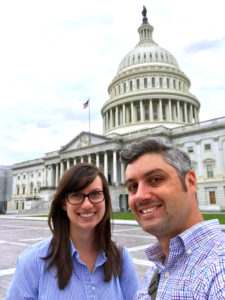 Ryan Haupt is a paleontologist and podcaster currently working on his Ph.D. at the University of Wyoming, and he served as the 2019–2020 GSA Science Policy Fellow.
Ryan Haupt is a paleontologist and podcaster currently working on his Ph.D. at the University of Wyoming, and he served as the 2019–2020 GSA Science Policy Fellow.
What was/is your role with the GSA Policy Office? And how would you describe your experience?
I served as GSA’s Science Policy Fellow from September 2019 to August 2020. The role of the Science Policy Fellow is to work with the Director for Geoscience Policy to track geoscience-related legislation in Congress by attending hearings and Hill briefings, keep GSA members informed about policy activities, help run the Geoscience Congressional Visits Days (which I participated in myself a few years back), work with GSA’s Geology and Public Policy Committee, and just generally help bridge the gap between policymakers and GSA’s members. Thanks to the COVID-19 pandemic I feel like I had two very different six-month fellowships. For the first six months, I was on the Hill a few times a week, in and out of meetings, learning my way around the tunnels underneath all the congressional buildings, and just having a blast. As you can probably guess from the long list of responsibilities it was a lot of work, but I was enjoying the pace and getting to meet so many smart and accomplished people.
Then we started hearing rumblings about a virus and the world turned upside down. One of the first major impacts on my life thanks to the pandemic was when the NE/SE GSA Section Meeting was cancelled, which was absolutely the right call, but also set the tone for just how different the rest of my fellowship would be. The rest of the fellowship was spent adjusting to the digital life we’ve all had to come to terms with. We still had a lot of the same meetings, but many of our science policy goals for the year were derailed by Congress dealing with the pandemic. Every major event was rescheduled for September, optimistic in hindsight, and after my term as fellow would be over anyway. I left the office in March and didn’t return until August to turn in my badge and laptop and sanitize my office for the next fellow. I was sad my fellowship ended during such strange times, but I’m glad to have accomplished what I could.
What inspired you to work in both politics and geology?
I would say the two interests were sparked independently of one another and then grew together, like when stalactites and stalagmites connect and form a single column. In college, I ended up double majoring in biology and geology because I wanted to go into paleontology, but a specific paleo degree didn’t exist. I loved studying both, but really felt at home with the other geology students. I felt like I’d found my people. Like many others, college is also when I became a more politically aware and engaged person, but my true passion for the role of policy came from binging the—in hindsight somewhat fantastical—West Wing. I loved watching smart and competent people work together to accomplish big things in the service of other people. While I was in grad school, my girlfriend (now wife) got a job with the Smithsonian and moved to D.C., which was when I really started looking for opportunities in the world of science policy. My first opportunity was participating in a Geoscience Congressional Visits Day. After my day on the Hill meeting with legislators and their staff I was hooked, and I’ve been looking for opportunities to get and stay involved in science policy and the work GSA does in that space ever since.
What are you most proud of from your time with the GSA Policy Office?
I don’t have a single moment I’m most proud of while I was with the GSA Policy Office, but there are a few recurrent themes that I feel really good about. My favorite days were the days I got to spend on the Hill with GSA members interfacing with their legislators’ offices and staff. Helping geoscientists engage in productive conversations with policymakers was always a treat, and I felt like one of my strengths in my role as a fellow was serving as a liaison between those two groups in the moment. Early in the fellowship when I felt like I’d been tossed in the deep end a little, I’d had a long but productive day running around the Hill. As I was leaving for the day to head home, I turned and saw the sun setting behind the Capitol dome and just thought to myself, “Yeah, this does not suck.”
Why should people support programs like the GSA Policy Office?
I think there isn’t enough awareness around how much GSA does when it comes to science policy. I think our society could benefit greatly from more of our members taking an active interest in the science policy work being done on their behalf in D.C. Even making the occasional phone call to their specific congress people’s offices about the geoscience (and other) issues that matter to them can have a huge impact over time. I feel like geologists in particular can appreciate the large effects that a small but repeated process can have, given enough time.
What would you like to say to other people who donate their time and resources to GSA?
Thank you! Learning about and working on science policy for GSA was a great privilege for me and something I did not take lightly. The work certainly isn’t thankless, but it does largely fly under the radar. I want to offer kudos and make sure that those who donate their time and resources get the credit and appreciation they deserve for working to support our field and our community.
Caption: Ryan Haupt with 2018–2019 GSA Science Policy Fellow Laura Szymanski.
